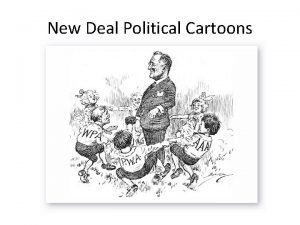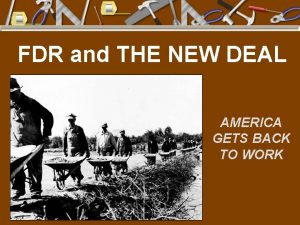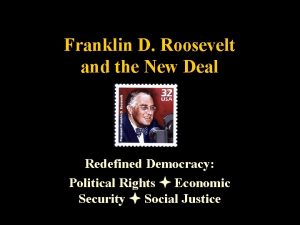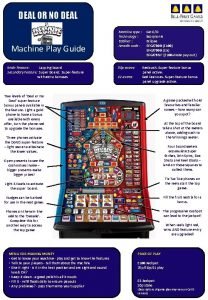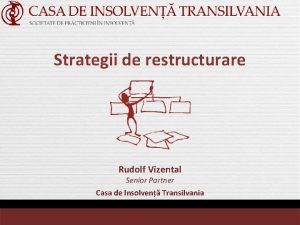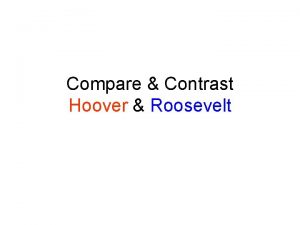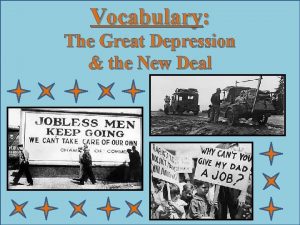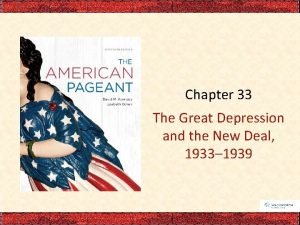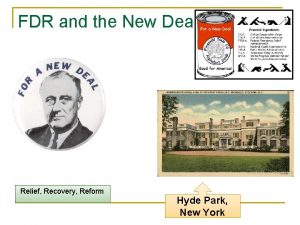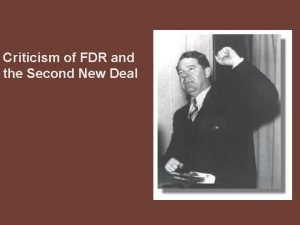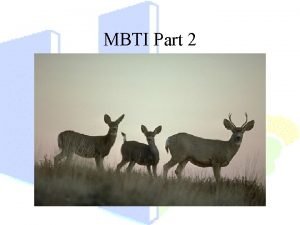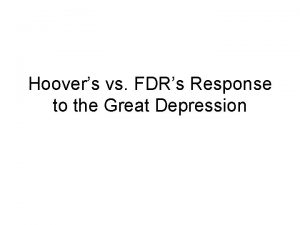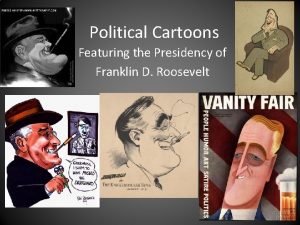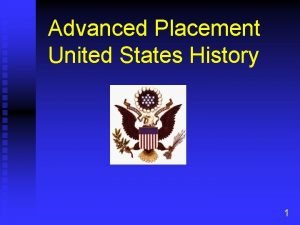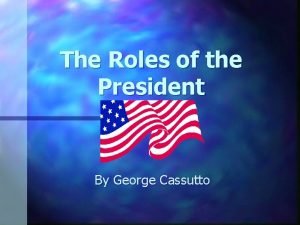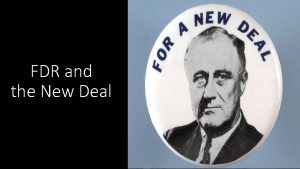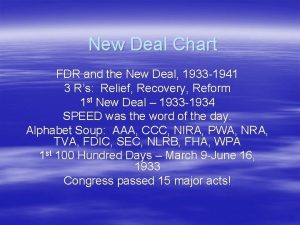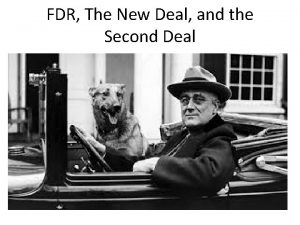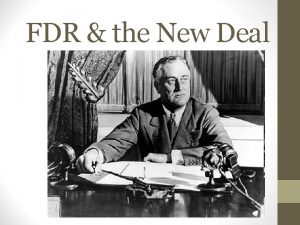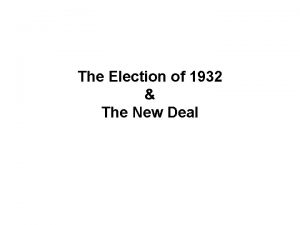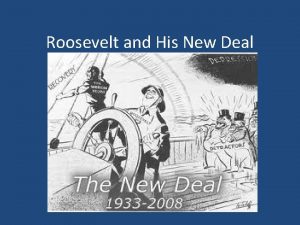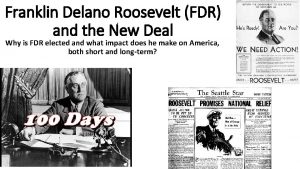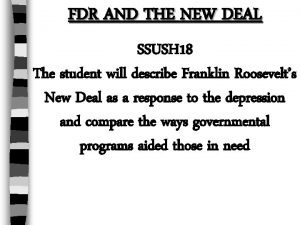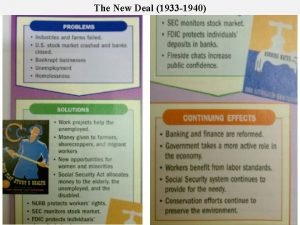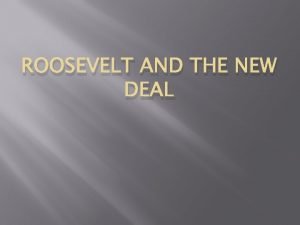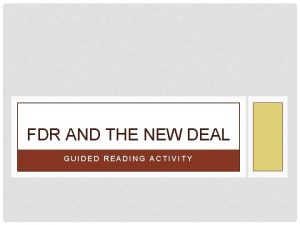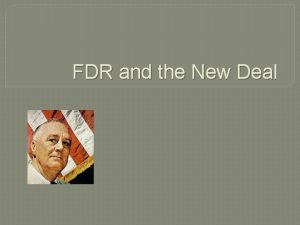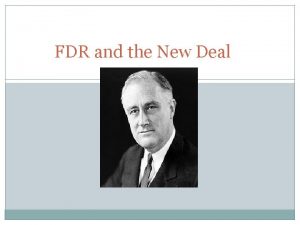FDR and The New Deal The Election of






















- Slides: 22

FDR and The New Deal

The Election of 1932 • Americans blamed President Hoover for the country’s economic woes. • Franklin Delano Roosevelt won the Democratic Party’s nomination. – He was related to Theodore Roosevelt. – He survived polio. – He was governor of New York. • Roosevelt promised relief for the poor and more public works programs to provide jobs. He attacked Hoover and the Republicans for their response to the Great Depression. • November 1932, Roosevelt won a landslide victory— winning more than 57 percent of the popular vote.


The “Brain Trust” • FDR won the election in Nov. 1932, but did not take office until March of 1933. (20 th Amendment, which moved the presidential inauguration to January, was not ratified until Feb. 1933 and did not apply to the 1932 election) • During the waiting period, Roosevelt carefully picked advisors known as the “Brian Trust”, which included professors, lawyers, and journalist. • With the help of the “Brain Trust”, Roosevelt formulated a new set policies called the New Deal.

FDR and the First Hundred Days • The First Hundred Days - was a critical period of government activity in which Roosevelt pushed Congress to put more than 15 major pieces of his New Deal into legislation. • The New Deal promised relief, recovery and reforms. • These laws and others that followed significantly expanded the Federal Governments role in the nations economy.

FDR and the First Hundred Days Banking Crisis (1 st stage of reform) • Temporarily closed all the nation’s banks to stop panic and large-scale withdrawals – Passed the Emergency Banking Relief Act – Glass-Steagall Act created the FDIC Fireside Chats • Radio talks by FDR about issues and the New Deal programs


Trouble For The New Deal Deficit Spending • spending more than the government receives to help get the economy growing again. – Roosevelt was reluctant to adopted deficit spending, but believed it was necessary to restore the nations economy.

Critics Of The New Deal Radical Reactions to the New Deal - Believed the New Deal did not go far enough in reforming the economy - Wanted a complete overhaul of capitalism Huey P. Long (senator from Louisiana) Believed Roosevelt’s policies were too friendly to banks and businessmen (started the Share Our Wealth Society) Father Charles Coughlin (the “radio priest”) Believed Roosevelt was not doing enough to curb the power of bankers and financial leaders Dr. Francis Townsend Criticized the New Deal for not doing enough for older Americans (wanted pensions for people over 60)


Critics Of The New Deal Cont. Conservative Reactions to the New Deal - Attacked the New Deal as a radical break with traditional American ideals - Thought the New Deal would drive the country to destruction. The American Liberty League Believed that the New Deal went too far, made people dependent on the government, and was anti-business

Supreme Court Attacks the New Deal • Supreme Court struck down two New Deal programs, declared them unconstitutional because they gave the president too much power – National Industrial Recovery Act (NIRA) – Gave legislative power to the executive and violated state rights. – Agricultural Adjustment Act (AAA) – Agriculture was a state matter rather then federal

The Court-Packing Bill Roosevelt’s Plan • Proposed giving the president power to appoint six new Supreme Court judges. – Roosevelt argued that changes were needed to make the courts more efficient. – Most observers saw plan as effort to “pack” the court with friendly justices.

The Court-Packing Bill Cont. • Storm of protest in Congress and the press, because the plan violated separation of powers • Even though the bill never passed, Roosevelt ended up getting to appoint new justices after elderly judges retired


The Second Hundred Days / The Second New Deal • Roosevelt launched the Second New Deal in the spring of 1935. • Congress funded new programs – Including the Social Security Act • Provided guaranteed, regular payments for people 65 and older, or disabled • Included a system of unemployment insurance


The New Deal Revives Organized Labor Roosevelt backed the Wagner Act, or the National Labor Relations Act (NLRA). - Guaranteed workers the right to form unions and bargain collectively. - Outlawed a number of anti-labor practices, and voting in workplaces to determine whether employees wanted union representation Committee for Industrial Organization (CIO) – John L. Lewis led this group to break away from the American Federation of Labor (AFL) in 1935. – The United Auto Workers (a division of the CIO) launched a successful sit-down strike in 1936.

New Roles for Women • Roosevelt promoted and recognized women. • Frances Perkins – Secretary of Labor – was the first woman to head an executive office. • Roosevelt appointed two female diplomats and a female federal judge • Still, women faced challenges and discrimination. – Lower wages – Less opportunities – Hostility in the workplace

New Roles for African Americans • Roosevelt’s administration also appointed many African Americans. – A group of African Americans hired to fill government posts were known as the Black Cabinet, and they served as unofficial advisors to the president. – The Black Cabinet met under the leadership of Mary Mc. Leod Bethune, director of Negro Affairs in the National Youth Administration. • Still, African Americans continued to face tremendous hardships during the 1930 s. – Severe discrimination – Thousands of African American sharecroppers and tenant farmers were not helped by New Deal programs. – Southern Democrats in Congress opposed efforts to aid African Americans.

The Impact of the New Deal • The New Deal promised relief, recovery, and reform. – Relief programs put billions of dollars into the pockets of poor Americans. – The New Deal was less successful in delivering economic recovery. – New Deal reforms were successful and long-lasting. • The New Deal changed the link between the American people and their government. – Roosevelt believed that government could help businesses and individuals achieve a greater level of economic security. – The New Deal required a much bigger government. – Americans now began to look regularly to government for help.

 Tennessee valley authority political cartoons
Tennessee valley authority political cartoons New deal fdr
New deal fdr Fdr election map
Fdr election map Deal or no deal machine
Deal or no deal machine Asset deal vs share deal
Asset deal vs share deal Hoover and roosevelt compare and contrast
Hoover and roosevelt compare and contrast The great depression vocabulary
The great depression vocabulary Dust bowl migration map
Dust bowl migration map What is the main idea of the cartoon?
What is the main idea of the cartoon? Chapter 33 the great depression and the new deal
Chapter 33 the great depression and the new deal Fdr q value
Fdr q value Fdr
Fdr Examples of relief recovery and reform
Examples of relief recovery and reform Criticism of fdr
Criticism of fdr Fdr
Fdr Courtois mbti
Courtois mbti Hoover v. fdr responses to the great depression
Hoover v. fdr responses to the great depression Inaugural address
Inaugural address Fdr died
Fdr died Fdr
Fdr Enoxoparine
Enoxoparine Fdr dies truman becomes president
Fdr dies truman becomes president George cassutto
George cassutto
